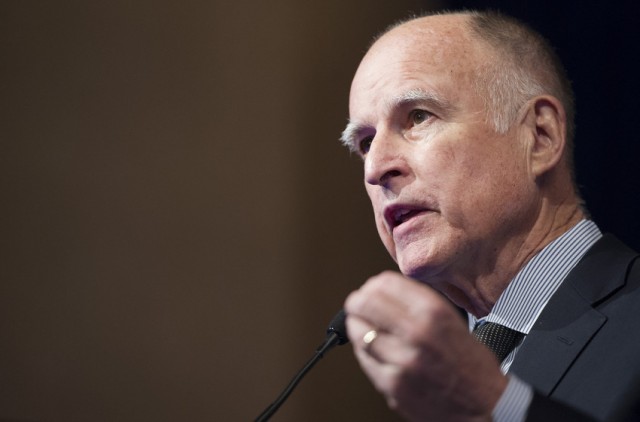Bloomberg News today takes a further look at California's leadership on climate change, including the proliferation of electric vehicles, reporting that 40 percent of plug-in electric vehicle sales occur in California. For more, check out KQED Science's climate coverage.
Here are Brown's full remarks:
The California story is a very hopeful one. It's a story of Republican and Democratic governors pioneering innovative climate strategies. It's not been easy, it's not without contest, but we're making real progress. In fact, the people themselves have been involved when those who oppose carbon pricing put the measure to a popular referendum. And in that vote just a few years ago, the people voted overwhelmingly to stay the course.
So, what do we have? Well, we've got a goal to have one-third of our electricity sector renewable by 2020. We're at 23 percent today and we will make it probably in the next three or four years, and then we'll go beyond that. We have a goal of a million electric cars - we have 100,000 on the roads today - and we have the toughest vehicle emission standards anywhere in the country. In fact, the country now has adopted the California standard. And I want to point out that that standard was developed under a special prerogative given to California when Ronald Reagan was governor and Richard Nixon was president. Our climate law was enacted by my Republican predecessor Arnold Schwarzenegger.
So, the efforts that we're making in California don't derive from one party or one politician - they're the work of activists, business people and elected representatives. We also, over the last 30 years, have developed the toughest building standards anywhere in the country, which have saved California literally tens of billions of dollars in avoided energy costs. Same thing with appliance standards.
So, now the great challenge is to stay the course. Even today, as we speak, there are advertisements being purchased on the airwaves of California in an attempt to persuade the people that cap-and-trade should somehow go away. That it's going to raise the price of oil. Luckily the price of oil has been coming down ever since those ads went on the air just a month or so ago. So, somebody's watching over California.
Carbon really has been at the basis of the incredible progress and prosperity and affluence that so many people enjoy. But that progress now has the dark shadow of the toxicity of carbon itself. The pollution, the smog, the health effects, the rising sea level - in California, the forest fires which are now burning for more days than historically was ever imaginable - it's real, it's here and we've got to put a price on carbon. Which we have, we have a $13 price on carbon and our cap-and-trade system covers 85 percent of greenhouse gases. And yet, California is expected to outproduce - in terms of GDP, California is looking forward to very solid growth, higher than the national level.
So you can do carbon pricing, you can do renewable energy, you can do building standards and you can get it done and you can still have a very vibrant economy. So that's what we have and I want to thank all of you here today because this is a heroic challenge that we have to face. And this is probably the greatest assemblage of committed people to get it done. So, I think we're on the right path. Thank you.
Jon Brooks contributed to this report.
